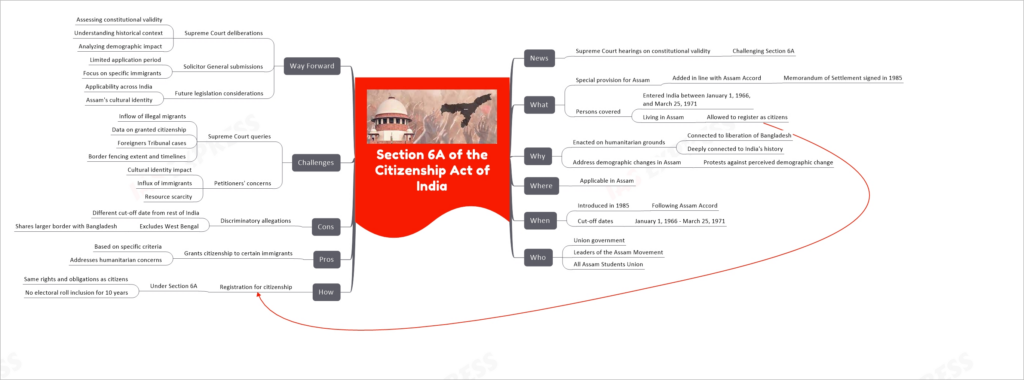Section 6A of the Citizenship Act
Mind Map
Table Chart
| Category | Details | Subdetails |
|---|---|---|
| News | Supreme Court hearings on constitutional validity | Challenging Section 6A |
| What | Special provision for Assam | Added in line with Assam Accord |
| Memorandum of Settlement signed in 1985 | ||
| Persons covered | Entered India between January 1, 1966, and March 25, 1971 | |
| Living in Assam | ||
| Allowed to register as citizens | ||
| Why | Enacted on humanitarian grounds | Connected to liberation of Bangladesh |
| Deeply connected to India’s history | ||
| Address demographic changes in Assam | Protests against perceived demographic change | |
| Where | Applicable in Assam | |
| When | Introduced in 1985 | Following Assam Accord |
| Cut-off dates | January 1, 1966 – March 25, 1971 | |
| Who | Union government | |
| Leaders of the Assam Movement | ||
| All Assam Students Union | ||
| How | Registration for citizenship | Under Section 6A |
| Same rights and obligations as citizens | ||
| No electoral roll inclusion for 10 years | ||
| Pros | Grants citizenship to certain immigrants | Based on specific criteria |
| Addresses humanitarian concerns | ||
| Cons | Discriminatory allegations | Different cut-off date from rest of India |
| Excludes West Bengal | ||
| Shares larger border with Bangladesh | ||
| Challenges | Supreme Court queries | Inflow of illegal migrants |
| Data on granted citizenship | ||
| Foreigners Tribunal cases | ||
| Border fencing extent and timelines | ||
| Petitioners’ concerns | Cultural identity impact | |
| Influx of immigrants | ||
| Resource scarcity | ||
| Way Forward | Supreme Court deliberations | Assessing constitutional validity |
| Understanding historical context | ||
| Analyzing demographic impact | ||
| Solicitor General submissions | Limited application period | |
| Focus on specific immigrants | ||
| Future legislation considerations | Applicability across India | |
| Assam’s cultural identity |
Explanation
Section 6A of the Citizenship Act of India is a special rule about who can become a citizen in the state of Assam. It was made in 1985 based on the Assam Accord, an agreement to solve problems in Assam about people moving there. This rule says that people who came to Assam from other countries between January 1, 1966, and March 25, 1971, can become Indian citizens, but they can’t vote for 10 years. This rule was made to help people and has to do with India’s history, like helping Bangladesh become free. The Supreme Court of India is looking at whether this rule is fair and follows the constitution. Some people think it’s not fair because it treats Assam differently than other states, like West Bengal, which also has many people coming from other countries. The court is also trying to figure out how this rule has changed Assam and what should be done about people who move to India illegally.
If you like this post, please share your feedback in the comments section below so that we will upload more posts like this.


